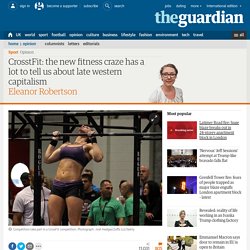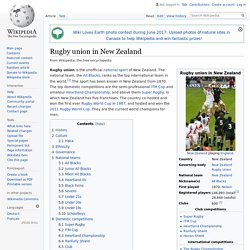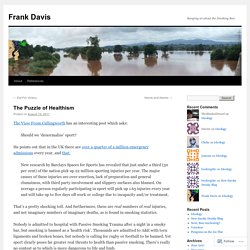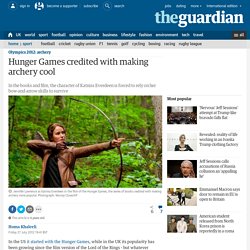

Participation in sport and influencing factors - Social groupings and participation in sport - OCR - GCSE Physical Education Revision - OCR - BBC Bitesize.
Family Background. Media. Socioeconomic Status. Peers. Women and Sport. Economics and Sport. CrosstFit: the new fitness craze has a lot to tell us about late western capitalism. If you're the kind of person who keeps abreast of fitness trends or is at all interested in rubbernecking at the absurd extremes of human behaviour, you've probably heard of CrossFit.

CrossFit, according to the official description, is "constantly varied functional movements executed at high intensity across broad modal and time domains". This is CrossFit speak for "running, jumping, and lifting things until you vomit or make it through to a higher astral plane based on the mind-cleansing properties of extreme pain". Back in the day if you wanted to get fit, all you had to do was throw on some Howard-style trackie dacks and take the dog down the park to scare some children.
Rugby union in New Zealand - Wikipedia. Rugby union is the unofficial national sport of New Zealand.

The national team, the All Blacks, ranks as the top international team in the world.[2] The sport has been known in New Zealand from 1870. The top domestic competitions are the semi-professional ITM Cup and amateur Heartland Championship, and above them Super Rugby, in which New Zealand has five franchises. The country co-hosted and won the first ever Rugby World Cup in 1987, and hosted and won the 2011 Rugby World Cup. They are the current world champions for men. History[edit] The 1884 team that toured New South Wales, Australia. What is healthism? (part one) Throughout history there’s been an understandable desire to find connections between our behavior and our health.

Human beings have practiced health regimens involving diet, exercise and hygiene since antiquity. When medicine was based on the humoral theory of disease, for example, individuals were advised to purge the body in the spring and, in the summer, avoid foods or activities that caused heat. Bathing in ice water was recommended in the 19th century.
Mark Twain quoted the advice: “the only way to keep your health is to eat what you don’t want, drink what you don’t like, and do what you’d druther not.” In the second half of the 20th century many Americans adopted the idea that a ‘healthy lifestyle’ (diet, exercise, not smoking, etc.) was a good way to prevent disease and live longer. One of the terms used to describe the enormous increase in health consciousness is ‘healthism.’ This post grew rather long, so I’ve divided it into two parts. The Puzzle of Healthism. The View From Cullingworth has an interesting post which asks: Should we ‘denormalise’ sport?

He points out that in the UK there are over a quarter of a million emergency admissions every year, and that: New research by Barclays Spaces for Sports has revealed that just under a third (30 per cent) of the nation pick up 22 million sporting injuries per year. The major causes of these injuries are over-exertion, lack of preparation and general clumsiness, with third party involvement and slippery surfaces also blamed. On average a person regularly participating in sport will pick up 1.65 injuries every year and will take up to five days off work or college due to incapacity and/or treatment. That’s a pretty shocking toll. Nobody is admitted to hospital with Passive Smoking Trauma after a night in a smoky bar, but smoking is banned as a ‘health risk’. And it really goes to show that the smoking ban has got nothing to do with health. Does that stack up? It’s a puzzle. Like this: Like Loading... Developmental Sport and Exercise Phychology. School Culture Definition. The term school culture generally refers to the beliefs, perceptions, relationships, attitudes, and written and unwritten rules that shape and influence every aspect of how a school functions, but the term also encompasses more concrete issues such as the physical and emotional safety of students, the orderliness of classrooms and public spaces, or the degree to which a school embraces and celebrates racial, ethnic, linguistic, or cultural diversity.

The importance of sport in NZ. “A nation united,” screamed the headlines, after the Black Caps historic Cricket World Cup semi-final win.

There we all were, backing our team, fingers crossed, face-paint applied. But what about those people that don’t like sport. Or – worse somehow – just don’t care? And given New Zealanders’ abilities in fields like science and film-making, should we still be making such a big deal of sport? At its very best, a sporting match is great drama. Grassroots rugby in New Zealand - Tourism New Zealand Media. So ingrained is the national sport that many babies are sporting black shirts with the silver fern before they can walk, and toddlers often learn to kick a ball before they can talk.

For many it’s the start of a life-long involvement in a sport that is so entwined with the New Zealand way of life that it’s almost a barometer of the health of the nation. New Zealand’s national game. Hunger Games credited with making archery cool. In the US it started with the Hunger Games, while in the UK its popularity has been growing since the film version of the Lord of the Rings - but whatever sparked the frenzy, it's hard to disagree that archery has quietly been becoming cool.

And Friday's Olympic event - which saw South Korean Im Dong-hyun break not one but two world records despite being registered as blind - will only cement the sport's status. "Last year there was a survey of 12-18 year olds who were asked what Olympic sport they would like to try and archery came out top," said Peter Jones, from Archery GB. He points out membership has already risen from 16,000 people in 2004 to 36,000 in 2012.
"Our have-a-go sessions are fully booked and when I went to my local club the other day there was no room for new members" Heidi Nichol, from 2020 Archery said the Olympics were having an immediate effect.